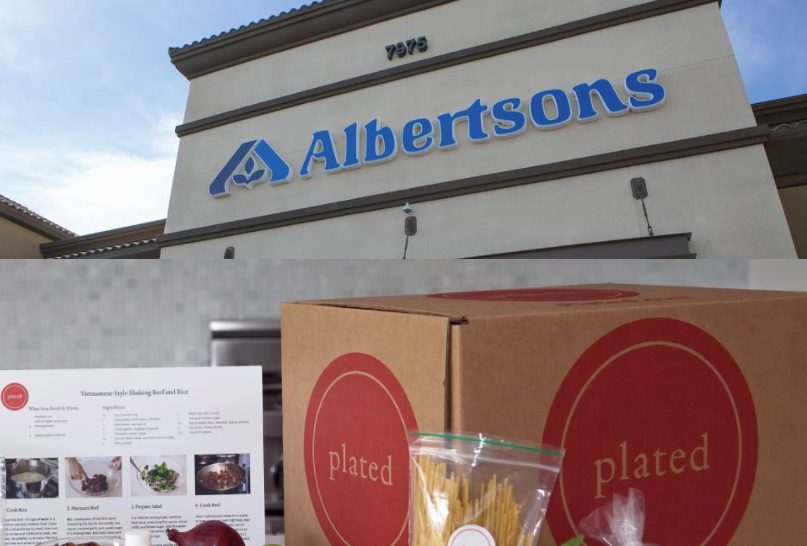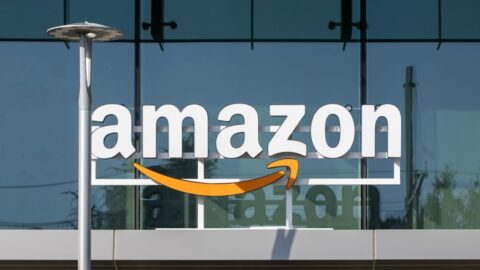Albertsons Co., the second largest supermarket chain in the U.S. by store count, is jumping into the $5 billion meal kit delivery market, acquiring Plated for an undisclosed sum. Plated will continue to sell its meals directly to consumers through its online subscription service, but in the coming months the company also will sell the kits in Albertsons stores.
In an interview with Retail TouchPoints, Michael McDevitt, CEO of healthy meal kit delivery service Terra’s Kitchen, noted that he sees the Albertsons-Plated acquisition as one of the “lead dominoes” that will fall, enabling the entire meal kit segment to thrive and expand going forward.
The deal represents the latest fusion of brick-and-mortar and online grocery sales, which kicked into overdrive when Amazon announced it had acquired Whole Foods Market in July. In combining two separate yet complementary business models, Albertsons and Plated are seeking to reel in more consumers and provide them with meal solutions at cheaper prices.
“From a business side, this provides the Plated organization with tremendous amounts of new potential customers and customer data,” said McDevitt. “There’s a lot of research of what’s moving in food that they can incorporate into their business model. A trusted brand like Albertsons, and the different brands they’re affiliated with, can offer the consumer better pricing options as well. The buying power Albertsons possesses offers Plated a lot of advantages. As a smaller organization, your buying power is of course much smaller and your margins are lower. This combination could offer the Plated consumers the ability to have cheaper prices, which is definitely a huge barrier to entry for a lot of consumers in this segment.”
Albertsons certainly stands to gain a lot from this deal as well, especially since it drives revenue primarily from its approximately 2,300 stores across 35 states. The grocer would learn more about the transactional behavior of e-Commerce consumers and the demographics of groups it should be catering to — data that could help bolster its own online offerings. Additionally, the deal could help revive Albertsons’ long-dormant IPO plans.
E-Commerce grocery is expected to grow from $33 billion in 2016 (4% of the food and beverage market in 2016) to $70 billion (which will represent 8% of the market in 2021), according to the Future of Food Report from Inmar. The report estimated that Amazon will hold 33% of this market by then, providing a further incentive for Albertsons to work with an established meal kit player.
Driving Awareness To Meal Kits
Despite Blue Apron’s underperforming IPO in the wake of Amazon’s own meal kit entrance, the continued interest in these services from major players such as Kroger and Publix is a positive sign. Both retailers have built their own in-house meal kits offerings, demonstrating that there is more awareness and consumer interest within the segment as a whole.
“The hardest challenge about creating a new industry, especially the meal kit, is that it’s very expensive to create consumer awareness about it,” McDevitt said. “You’ve had companies like Plated, Blue Apron, Hello Fresh and Terra’s Kitchen. We spend a lot of marketing dollars to drive awareness to a consumer base. What we’re trying to sell could be a very similar product to what could be on grocery shelves, we’re just doing it in a different manner. To have a grocery partner integrate this correctly…that partner, due to having consumers walking through their aisles on regular basis, can drive massive awareness to their brand, which would be terrific for the meal kit. It drives those that aren’t familiar with the meal kit into the meal kit space.”
The Albertsons-Plated acquisition also could be a landmark test of how major supermarkets and grocers streamline their business models going ahead. McDevitt predicted that other large grocers and CPG players will continue to either acquire or partner with meal kit providers and other e-Commerce grocery services. He also has considered the possibility of his own company, Terra’s Kitchen, getting purchased by or partnering with a major grocery partner down the line.
“We’re about to see the world of grocery advance faster than the speed of Moore’s Law,” McDevitt said. “That’s due to Amazon throwing that first gauntlet down [in buying Whole Foods]. You’re going to see companies either adapt and succeed, or not adapt and fail. There’s two ways you can adapt and it really depends on the culture and the skill set. You can build your own innovation internally, and companies like Kroger are known for taking that path; they build it vertically. Albertsons has shown that it’s open to the concept of acquiring innovation. That’s often where you see a lot more success, because organizations that are these large behemoths are wise enough to understand what they don’t know. The challenge lies in the integration of the organization they’re bringing on board.”
Will Albertsons Revive IPO Chatter After The Investment?
Privately owned Albertsons Co., which operates stores under 20 brands including Albertsons, Safeway, Jewel-Osco, Acme and Shaws, put its IPO filing plans on hold in July after the Amazon-Whole Foods merger, two years after initially postponing such a listing.
The grocery giant may feel it needs this acquisition to get its IPO plans back on track, especially given that comparable store sales dipped 2.1% in Q1 2017 (worse than the 0.4% decline throughout all of 2016), according to an SEC filing. And with the company expecting to spend approximately $1.5 billion in capital expenditures in 2017, Albertson already has taken a massive $204.9 million net loss in Q1.
In a RetailWire discussion, Ken Cassar, VP and Principal Analyst at Slice Intelligence, noted that the decision to go after Plated was a smart one, especially when the company’s spending habits are taken into account.
“They didn’t buy Blue Apron or Hello Fresh, which would’ve cost a fortune, but they’ve got a foot in the meal kit delivery space,” Cassar said. “I’d advise Albertsons to focus the current Plated mail order business on serving niches of customers with narrow dietary needs (vegan, low fat, Paleo, etc.) and target less expensive, more mass-oriented meals to store shoppers.”













